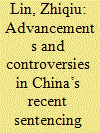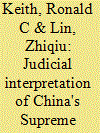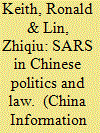| Srl | Item |
| 1 |
ID:
148503


|
|
|
|
|
| Summary/Abstract |
This article discusses in detail the content and context of China’s recent sentencing reform and its social, political, and criminal justice implications, as well as its limitations. The focus of China’s criminal justice reforms over the past 37 years has been predominantly on the trial process; the sentencing process has been largely neglected. Revelations of widespread sentencing inconsistency led the Supreme People’s Court (SPC) to initiate sentencing reform in 2005. The intent of the reform was to promote transparency in the sentencing process, ensure consistency in sentencing dispositions, and guard against inappropriate judicial leniency and severity via new sentencing procedural rules and guidelines limiting judges’ sentencing discretion. In addition to discussing the new sentencing procedures and guidelines, this article also examines some hotly debated issues, including whether China’s sentencing process should be completely separate from the trial process; the meaning of ‘sentencing consistency’ in the context of China’s social and political development; and China’s unique sentencing principles in comparison with the practice of some English-speaking jurisdictions.
|
|
|
|
|
|
|
|
|
|
|
|
|
|
|
|
| 2 |
ID:
090115


|
|
|
|
|
| Publication |
2009.
|
| Summary/Abstract |
The analysis of the profile and role of China's Supreme People's Court needs updating. The Court is actively developing new interpretative formats that concern its relations with sister organizations and the National People's Congress. This article contextualizes these formats within China's changing institutional dynamics. China does not have a separation of powers; however, the Chinese system of justice does have its own separation of functions. The Court is playing a pivotal role from within the changing separation of functions, but the extent and quality of its independence from other organizations are open to question. In the context of deepening legal reform, the law is still incomplete and imperfect, and Court interpretation has often served as "secondary law." In short, pragmatic judicial interpretations have sometimes preceded legislation by Congress. Remedy such as secondary law might be justified as absolute administrative necessity given the outstanding structural problems that characterize China's criminal justice system, but it has attracted internal criticism that argues for narrowing the function of the Court to a more tightly disciplined judicial role as well as for plugging the holes in legal process and structure by creating guiding case law and supporting the "freedom of judge's decision making."
|
|
|
|
|
|
|
|
|
|
|
|
|
|
|
|
| 3 |
ID:
079927


|
|
|
|
|
| Publication |
2007.
|
| Summary/Abstract |
This article surveys the Chinese response to SARS in law and politics. Over the course of the spread of SARS the party-state qualified legal reform strategy that was designed to provide new human rights protection and to curtail the state's arbitrary resort to policy and regulation without the benefit of law. This immediate response revealed the underlying problems of rule-of-law making, but the experience of SARS later informed the creation of new and improved law on infectious disease that reiterated the original assumptions of legal reform within a newly developing approach to the public management of health crises.
|
|
|
|
|
|
|
|
|
|
|
|
|
|
|
|